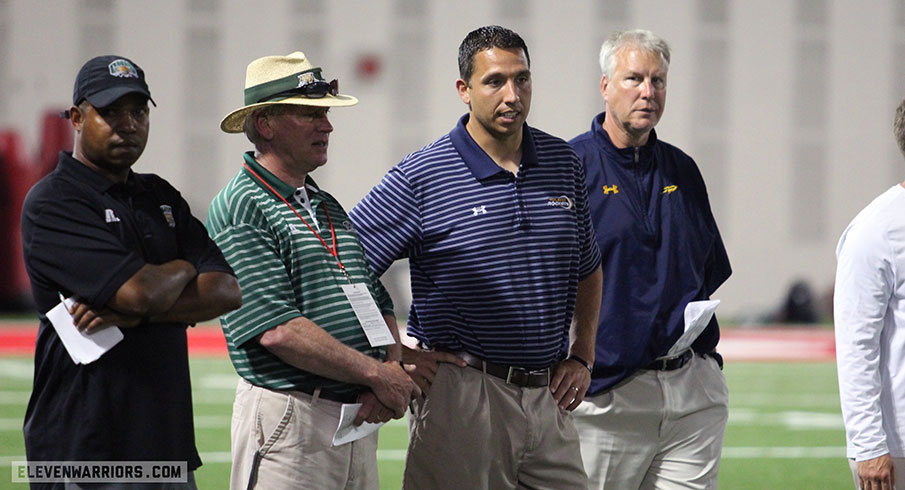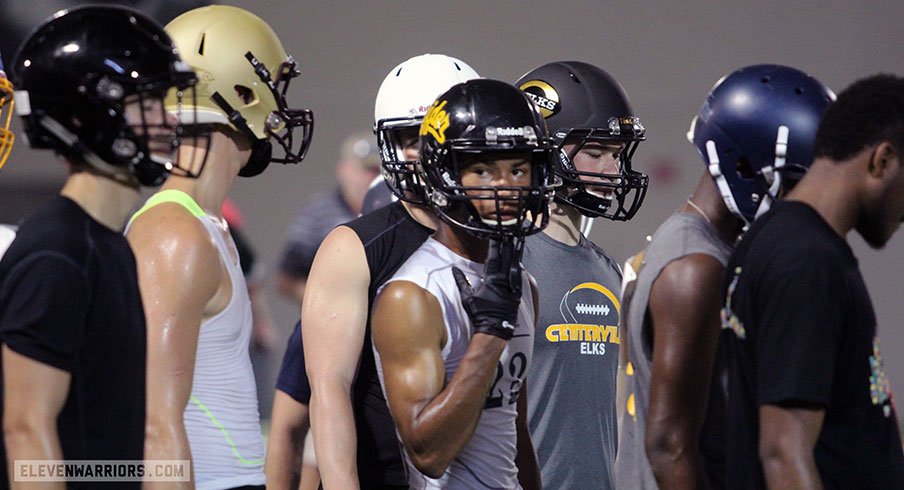Nordonia High School football coach Jeff Fox says he is usually cautious with what he puts on his Twitter account, often hesitant to express himself as his handle, @NordoniaKnightFB, is representative of his entire football program. Fox knows he must be careful not to cross his personal beliefs with those of the school's football team.
Saturday morning, however, Fox couldn’t help himself. He had something he needed to get off his chest.
“I’m usually very guarded with my Twitter my account and Saturday morning I fired off three tweets in a row,” Fox told Eleven Warriors on Tuesday night. “I was actually emotional and had my knee-jerk reaction to their knee-jerk reaction.”
The response from Fox was a direct result of the NCAA announcing Friday that, effective immediately, schools in the Football Bowl Subdivision are now required to conduct camps and clinics at their school’s facilities only and, additionally, that other FBS coaches are no longer able to staff camps at other schools.
In short, it waved goodbye to the satellite camp era.
The NCAA’s announcement of the decision made by its Division I Council led Fox to express his displeasure for the decision publicly, and he wasn’t the only prep coach to do so. Eleven Warriors spoke with four high school football coaches around the state of Ohio and the general consensus was the NCAA made a massive mistake.
“I really think the NCAA dropped the ball on this one,” said John Rodenberg, head coach at Cincinnati Archbishop Moeller High School, one of the premier programs in the state of Ohio.
The new ban of these camps does not benefit any of the college programs nor do they help the high school prospects attempting to earn scholarships at any level. In the past, prospects from all around the state of Ohio could come to a positional camp in Columbus at Ohio State and be seen by the majority of the six Mid-American Conference programs in the state as well as other FCS, Division II and Division III programs.
Additionally, several of the MAC schools throughout the state — Toledo, Ohio and Bowling Green to name a few — hosted satellite camps around the state to bring their programs to the kids rather than force the players to travel to them. Fox said several MAC schools hosted camps at a nearby high school every summer that his kids would attend each year. They’d get looked at by the school hosting, sure, but there would also be multiple FCS, Division II and Division III schools in attendance, as well.
“Our kids could literally drive down Northfield Road for 10 minutes, pay the minimum and get evaluated by yes, all those Mid-American Conference schools, but we have a player at Mercyhurst, a player at Edinboro, a player at Ohio Dominican, a player at Ashland and Baldwin Wallace, John Carroll, Mount Union in Division III,” Fox said. “Guess where all of those guys got recruited to all of the schools they actually ended up at?”
The new rules don’t stop those FCS, Division II and Division III programs from attending these camps, but they do prevent schools from taking their camps on the road. Recruits are now forced to travel to various campuses as opposed to programs bringing the camps to the prospects.
And now because other FBS programs can’t attend some of the state’s larger camps — like the three Ohio State holds every summer — recruits are now forced to travel to more camps if they want to be seen by multiple FBS-level programs.
“It hurts schools and it hurts kids,” said Greg Dempsey, the head coach at Toledo Central Catholic High School. “I don’t know why you would do something that harms the two biggest things you’re trying to help.”

Additional travel also creates a financial burden — one a lot of prospects simply can’t afford. Camps usually cost around $40 or $50 apiece, and if a recruit is trying to get in front of as many college coaches as possible, it’s going to cost quite a bit of money.
A lot of prospects and their families don’t have that option.
“It was easy to get a group together, they could carpool, it was 40 bucks to go to the one in Bedford [Ohio] and it was close. It was just all-around convenient and it wasn’t expensive,” said North Ridgeville High School coach Luke Durbin. “Now, when you tack on miles and gas and everything else to go to different places it could be be quite a lot.”
Added Rodenberg: “I coach an upper-middle class school. I feel so bad for some of these schools that are inner city-type schools where these kids maybe only have a chance to go to one camp and be looked at by multiple colleges.”
Because of these probable financial restrictions, prospects now will likely have to be much more selective in choosing which camps they attend each summer. They likely won’t be able to be seen by as many schools as they originally hoped, so they’re somewhat forced to choose a select few.
This brings up another potential issue: Recruits receiving advice they may not want to hear. Prospects sometimes don't like being told where they can and cannot play at the next level.
“I’m a high school coach and I’m going to tell my own kid, ‘Hey, it doesn’t make sense for you to go to Ohio State’s camp and then this and this. Maybe you should consider picking one MAC school and a couple others instead,’” Fox said. “You know what a high school kid and a parent is going to say when their high school coach is telling them that? ‘He’s holding me back. He’s not giving me the opportunity.’”
“There could be issues within your own team if you tell somebody to go to Toledo or Bowling Green camps and not to go to Ohio State. You could offend somebody,” Dempsey added. “You don’t want to cause problems on your own high school team. I’ll always be honest, but that’s really putting us in a situation that we don’t need to or want to deal with of trying to tell our families not to do something because you’re probably not [at that level yet].”
Some may argue that a recruit’s game film is what college coaches should base their scholarship offers from and, additionally, question the true value of these camps. And while the general consensus among high school coaches was that game tape is probably the No. 1 factor when it comes a college coach’s evaluation, there is absolutely value in having the ability to evaluate a prospect in person.
“The exposure, the original finding out about you may happen without a camp, but the actual evaluation needs to take place 90 percent of the time, even for the better kids.”– Jeff Fox, Nordonia High School head coach
“Even when you watch tape you’re not sure of the level or quality of opponent. It’s another thing to see a kid move live,” Durbin said. “I still think watching tape should be the No. 1 thing that people recruit on, and it probably still is, but this stuff helps. Absolutely.”
In-person evaluations don't only mean something to borderline prospects, either. Those evaluations are important to certain recruits that are receiving interest from Power Five schools, too. Fox, who coached current Ohio State cornerback Denzel Ward in high school at Nordonia, said the Buckeyes had interest in offering Ward based off his game tape, but they needed to see him perform in person at a camp before extending a scholarship offer.
Ward is hardly the only player to be asked to do such a thing.
“I don’t know, there’s maybe the top, top guys, maybe a handful that Ohio State-types offer just off of film and they don’t need to evaluate,” Fox said. “The exposure, the original finding out about you may happen without a camp, but the actual evaluation needs to take place 90 percent of the time, even for the better kids.”
Ohio State head coach Urban Meyer addressed the issue at a press conference Monday, saying he hoped the NCAA would revisit the decision. Meyer acknowledged the ban on satellite camps likely wouldn’t have much of an impact on his program — if you’re good enough to play at Ohio State, the Buckeyes will find you — but it absolutely affects hundreds of high school football prospects as well as the non-Power 5 programs.
Michigan head coach Jim Harbaugh, who made this whole satellite camp debate famous last summer despite the fact they've been around for years, told Sports Illustrated on Tuesday, "The image that comes to my mind is guys in a back room smoking cigars, doing what they perceive is best for them. It certainly isn't the best thing for the youngsters. It's not the best thing for the student-athletes."
High school coaches agreed.
“The majority of these power conference camps were staffed by MAC coaches and other coaches at that level,” Dempsey said, “and the exposure that provided the kids at the level they’re more capable of playing is gone.”
Dempsey, Durbin, Fox and Rodenberg all expressed hope that if the NCAA wouldn't reverse its ruling, it would at least alter it a bit. And perhaps there's no clear-cut way to solve this.
But what is clear right now, in the minds of high school coaches around the state of Ohio, is that the NCAA's announcement was wrong.
“The NCAA says they’re doing it for the benefit of the kid, but no they’re not,” Rodenberg said. “I just think they dropped the ball and I do hope they change it.”


